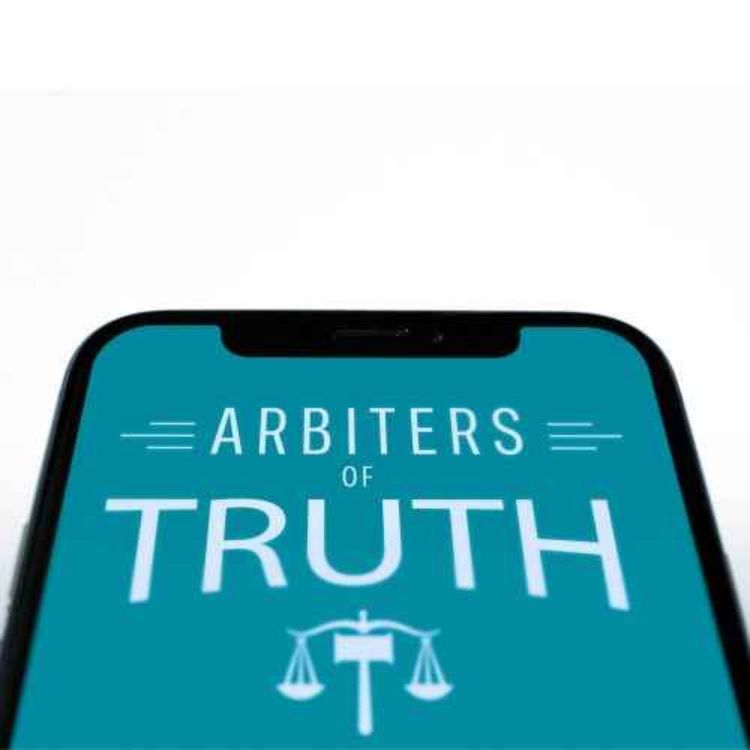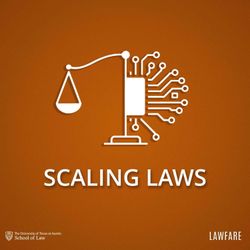Share

Scaling Laws
Jeff Horwitz on Broken Code and Reporting on Facebook
In 2021, the Wall Street Journal published a monster scoop: a series of articles about Facebook’s inner workings, which showed that employees within the famously secretive company had raised alarms about potential harms caused by Facebook’s products. Now, Jeff Horwitz, the reporter behind that scoop, has a new book out, titled “Broken Code”—which dives even deeper into the documents he uncovered from within the company. He’s one of the most rigorous reporters covering Facebook, now known as Meta.
On this episode of Arbiters of Truth, our series on the information ecosystem Lawfare Senior Editor Quinta Jurecic sat down with Jeff along with Matt Perault, the Director of the Center on Technology Policy at UNC-Chapel Hill—and also someone with close knowledge of Meta from his own time working at the company. They discussed Jeff’s reporting and debated what his findings tell us about how Meta functions as a company and how best to understand its responsibilities for harms traced back to its products.
More episodes
View all episodes

Rapid Response Pod on The Implications of Claude's New Constitution
55:44|Jakub Kraus, a Tarbell Fellow at Lawfare, spoke with Alan Rozenshtein, Associate Professor of Law at the University of Minnesota and Research Director at Lawfare, and Kevin Frazier, the AI Innovation and Law Fellow at the University of Texas School of Law, a Senior Fellow at the Abundance Institute, and a Senior Editor at Lawfare, about Anthropic's newly released "constitution" for its AI model, Claude. The conversation covered the lengthy document's principles and underlying philosophical views, what these reveal about Anthropic's approach to AI development, how market forces are shaping the AI industry, and the weighty question of whether an AI model might ever be a conscious or morally relevant being. Mentioned in this episode:Kevin Frazier, "Interpreting Claude's Constitution," LawfareAlan Rozenshtein, "The Moral Education of an Alien Mind," Lawfare
The Honorable AI? Shlomo Klapper Talks Judicial Use of AI
42:41|Shlomo Klapper, founder of Learned Hand, joins Kevin Frazier, the Director of the AI Innovation and Law Fellow at the University of Texas School of Law, a Senior Fellow at the Abundance Institute, and a Senior Editor at Lawfare, to discuss the rise of judicial AI, the challenges of scaling technology inside courts, and the implications for legitimacy, due process, and access to justice.
How AI Can Transform Local Criminal Justice, with Francis Shen
51:48|Alan Rozenshtein, research director at Lawfare, spoke with Francis Shen, Professor of Law at the University of Minnesota, director of the Shen Neurolaw Lab, and candidate for Hennepin County Attorney.The conversation covered the intersection of neuroscience, AI, and criminal justice; how AI tools can improve criminal investigations and clearance rates; the role of AI in adjudication and plea negotiations; precision sentencing and individualized justice; the ethical concerns around AI bias, fairness, and surveillance; the practical challenges of implementing AI systems in local government; building institutional capacity and public trust; and the future of the prosecutor's office in an AI-augmented justice system.
Release Schedules and Iterative Deployment with Open AI's Ziad Reslan
51:08|Ziad Reslan, a member of OpenAI’s Product Policy Staff and a Senior Fellow with the Schmidt Program on Artificial Intelligence, Emerging Technologies, and National Power at Yale University, joins Kevin Frazier, AI Innovation and Law Fellow at the University of Texas School of Law and a Senior Editor at Lawfare, to talk about iterative deployment--the lab’s approach to testing and deploying its models. It’s a complex and, at times, controversial approach. Ziad provides the rationale behind iterative deployment and tackles some questions about whether the strategy has always worked as intended.
A Year That Felt Like a Decade: 2025 Recap with Sen. Maroney & Neil Chilson
53:48|Connecticut State Senator James Maroney and Neil Chilson, Head of AI Policy at the Abundance Institute, join Kevin Frazier, the AI Innovation and Law Fellow at the University of Texas School of Law and a Senior Editor at Lawfare, and Alan Rozenshtein, Associate Professor at Minnesota Law and Research Director at Lawfare, for a look back at a wild year in AI policy.Neil provides his expert analysis of all that did (and did not) happen at the federal level. Senator Maroney then examines what transpired across the states. The four then offer their predictions for what seems likely to be an even busier 2026.
Cass Sunstein on What AI Can and Cannot Do
43:03|Alan Z. Rozenshtein, Lawfare senior editor and associate professor of law the University of Minnesota, speaks with Cass Sunstein, the Robert Walmsley University Professor at Harvard University, about his new book, Imperfect Oracle: What AI Can and Cannot Do. They discuss when we should trust algorithms over our own judgment, why AI can eliminate the noise and bias that plague human decision-making but can't predict revolutions, cultural hits, or even a coin flip—and, perhaps most importantly, when it makes sense to delegate our choices to AI and when we should insist on deciding for ourselves.
AI Chatbots and the Future of Free Expression with Jacob Mchangama and Jacob Shapiro
53:51|Renée DiResta, Lawfare contributing editor and associate research professor at Georgetown's McCourt School of Public Policy, and Alan Z. Rozenshtein, Lawfare senior editor and associate professor of law the University of Minnesota, spoke with Jacob Mchangama, research professor of political science at Vanderbilt University and founder of The Future of Free Speech, and Jacob Shapiro, the John Foster Dulles Professor of International Affairs at Princeton University. The conversation covered the findings of a new report examining how AI models handle contested speech; comparative free speech regulations across six jurisdictions; empirical testing of how major chatbots respond to politically sensitive prompts; and the tension between free expression principles and concerns about manipulation in AI systems.
Rapid Response Pod on the AI Preemption Executive Order
56:12|In this rapid response episode, Lawfare senior editors Alan Rozenshtein and Kevin Frazier and Lawfare Tarbell fellow Jakub Kraus discuss President Trump's new executive order on federal preemption of state AI laws, the politics of AI regulation and the split between Silicon Valley Republicans and MAGA populists, and the administration's decision to allow Nvidia to export H200 chips to China. Mentioned in this episode:Executive Order: Ensuring a National Policy Framework for Artificial IntelligenceCharlie Bullock, "Legal Issues Raised by the Proposed Executive Order on AI Preemption," Institute for Law & AI
Graham Dufault on small businesses and navigating EU AI laws
45:17|Graham Dufault, General Counsel at ACT | The App Association, joins Kevin Frazier, AI Innovation and Law Fellow at the University of Texas School of Law and a Senior Editor at Lawfare, to explore how small- and medium-sized enterprises (SMEs) are navigating the EU's AI regulatory framework. The duo breakdown the Association's recent survey of SMEs, which included the views of more than 1,000 enterprises and assessed their views on regulation and adoption of AI. Follow Graham: @GDufault and ACT | The App Association: @actonline